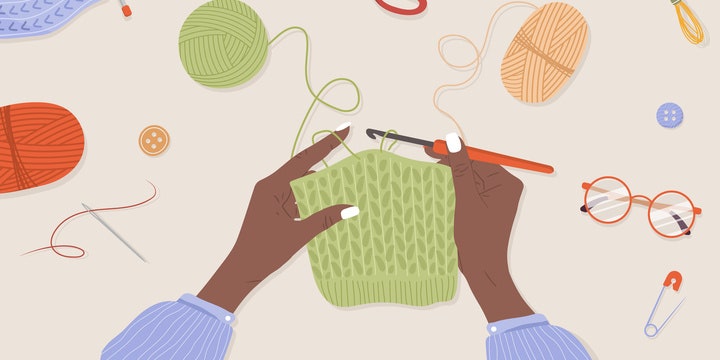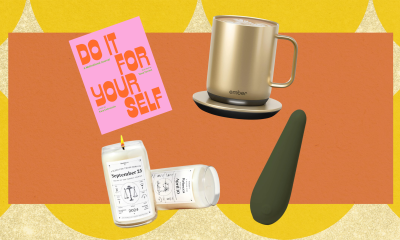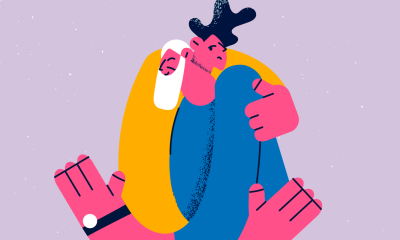Wellness
The Benefits of Knitting and Similar Hobbies: How They Can Help You Feel Calm, Focused, and Content

The Benefits of Knitting and Crocheting for Stress Relief
When Los Angeles-based Teri Slaven, 78, starts knitting, she immediately enters what she calls “the zone.” “I feel busy, focused, and content,” she tells SELF. For Carolyn Barnes, 33, from Tempe, Arizona, it’s crocheting. She started her new hobby after a death in her family and a stressful phase of parenthood. (Her sons were 1 and 3 at the time.) “I was grieving and really tired from motherhood,” she tells SELF. “I didn’t have anything left to give. But I knew I couldn’t give what little I had left to my phone.”
She bought a beginner’s crocheting kit, called Woobles, and although there was an initial learning curve, she recognized a sharp change in her brain right away. She was alert. “I felt a sense of purpose,” she explains.
If you’re on the hunt for a hobby that’ll potentially relieve stress, calm you down, and help you feel productive and fulfilled, knitting, crocheting, cross-stitching—any goal-directed pursuit you can do at home—might be worth looking into. Research suggests that manual tasks like these may help improve your attentiveness overall and boost your mood, for example. Other studies have found that learning new skills that require hand-eye coordination (like quilting or digital photography) seem to help combat cognitive decline in older age.
Here are all the things you may gain from this type of hobby (aside from a really sweet scarf).
1. It’ll give you a sense of control.
Ashley Matskevich, MD, a Boston-based psychiatrist, often “prescribes” these crafty types of activities for stressed-out clients. “I recommend everyone have a ‘third thing,’” she tells SELF. Work or family/relationships tend to be the first two “things,” but they are often largely out of your control (hence why they can be so freaking stressful). Having a goal-focused hobby returns that ultra-important sense of control, Dr. Matskevich says.
That objective could, quite literally, be anything that piques your interest. But for folks like Barnes, who are limited on time and accessibility (a.k.a. you can’t devote hours to marathon training, let alone leave the house), knitting and crocheting can be really ideal. “These activities are beneficial because they’re so dependable,” Dr. Matskevich explains. “Having something reliable, dependable, and that you’re in control of can be incredibly empowering.”
When Cara Bellucci, 31, from Philadelphia, starts knitting a new scarf or sweater, she knows she’s about to work toward a goal that’s truly hers. “I focus on improving at something that’s just for my own satisfaction,” she tells SELF. “In the end, I have tangible proof that making time for myself can lead to something meaningful and beautiful. I am asserting that I am worth the time and effort, and sometimes frustration, of a hundred little stitches.”
2. You might enter a more mindful, less stressed state.
When you’re particularly tense, there’s a lot of extra activity going on in your brain. In some cases, this might result in excess energy flowing (quite literally) to your limbs, resulting in repetitive motions like fidgeting or pacing (called psychomotor agitation). It’s a vicious cycle: “Your brain says, ‘We’re pacing and fidgeting, we must be stressed,’” Timothy Jeider, MD, a psychiatrist with Nevada Mental Health, tells SELF. Basically, knitting and crocheting can take the place of those nervous, undirected movements.
By focusing on the repetitive motions of knitting or crocheting, you may start to feel more calm and centered. “It can bring you into a more mindful state, where you’re really focused on what you’re doing in the present moment,” Dr. Jeider explains. This mindfulness can help you let go of stress and worries, at least temporarily, as you immerse yourself in the simple act of creating.
3. It could improve your mood and overall well-being.
Engaging in a creative hobby like knitting or crocheting has been linked to improvements in mood and overall well-being. Research shows that activities that require concentration and focus, such as crafting, can help reduce feelings of anxiety and depression. In fact, a study published in the British Journal of Occupational Therapy found that knitting can lead to feelings of happiness and relaxation, as well as an increased sense of purpose and accomplishment.
Whether you’re knitting a scarf for a loved one or crocheting a blanket for yourself, the act of creating something with your hands can be incredibly rewarding. The sense of accomplishment that comes from completing a project can boost your self-esteem and confidence. As you see your skills improve and your creations come to life, you may find yourself feeling more positive and optimistic about the future.
4. It promotes mindfulness and relaxation.
Knitting and crocheting require focus and attention to detail, which can help quiet a busy mind and promote relaxation. The repetitive movements involved in these activities can have a calming effect on the body and mind, similar to meditation or yoga. As you work on a knitting or crocheting project, you may find yourself entering a state of flow, where you are fully immersed in the task at hand and free from intrusive thoughts or worries.
This focused state of mind can be incredibly grounding and centering, helping you to stay present and connected to the present moment. By engaging in a creative hobby like knitting or crocheting, you can give yourself a break from the stresses and pressures of everyday life and create a sense of peace and tranquility. Taking time to slow down and engage in a mindful activity can have profound effects on your mental and emotional well-being.
5. It can boost cognitive function and brain health.
In addition to promoting relaxation and mindfulness, knitting and crocheting have been shown to have cognitive benefits as well. Research suggests that engaging in creative activities that require fine motor skills and hand-eye coordination, such as crafting, can help improve brain function and cognition. A study published in the Journal of Neuropsychiatry found that knitting can help improve memory and attention span in older adults, making it a valuable tool for combating cognitive decline.
By challenging your brain with new and complex tasks, you can strengthen neural pathways and improve cognitive function over time. Learning new knitting or crocheting patterns, following intricate instructions, and practicing different techniques can all help keep your brain sharp and agile. The mental stimulation provided by these activities can help protect against age-related cognitive decline and enhance overall brain health.
6. It fosters a sense of community and connection.
Knitting and crocheting are not only enjoyable and therapeutic activities, but they can also be a great way to connect with others and build a sense of community. Joining a knitting or crocheting group, attending a craft class, or participating in virtual crafting events can provide opportunities to meet new people, share tips and tricks, and learn from experienced crafters.
By engaging with others who share your love of knitting or crocheting, you can form meaningful connections and friendships that can enrich your life. Crafting together can create a sense of camaraderie and support, as you bond over a shared interest and passion. Whether you’re swapping yarn recommendations, discussing new projects, or simply enjoying each other’s company, knitting and crocheting can bring people together and create a sense of belonging.
In conclusion, knitting and crocheting offer a wide range of benefits for mental, emotional, and cognitive well-being. These creative hobbies can help reduce stress, promote relaxation, improve mood, boost cognitive function, and foster connections with others. Whether you’re a seasoned knitter or crocheter or a beginner looking to try something new, engaging in these activities can provide a sense of purpose, accomplishment, and fulfillment. So grab your needles and yarn, and start stitching your way to better health and happiness.

-

 News7 days ago
News7 days agoHave you experienced a ‘ghost poop’? Discover what doctors say about this bizarre phenomenon as TikTok users share videos of their puzzling experiences in the bathroom
-

 Investing7 days ago
Investing7 days agoThese high-dividend stocks boosted the Dow to new levels. How would you have done if you invested in them and held onto them?
-

 Finance6 days ago
Finance6 days agoFrance seeks to establish itself as a major player in the global AI industry, with assistance from U.S. Big Tech companies
-

 News7 days ago
News7 days agoTrump Found Guilty in Fox News Politics
-

 News7 days ago
News7 days agoCohen believes that the Trump hush money verdict is ‘precisely what America needs at this moment’
-

 Sport7 days ago
Sport7 days agoChristian McCaffrey still haunted by costly fumble in Super Bowl, says 49ers star and coach
-

 News7 days ago
News7 days agoSupreme Court Unanimously Rules in Favor of NRA’s Free Speech Challenge in New York
-

 News6 days ago
News6 days agoUVA to compensate families of victims in 2022 shooting that took lives of 3 football players and injured 2 others with $9 million
















